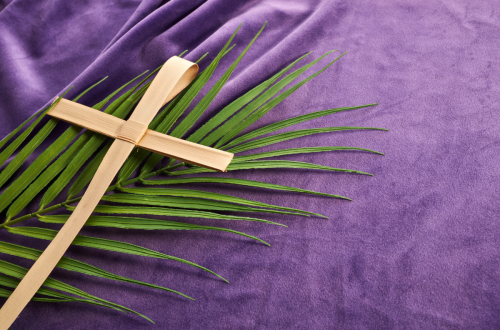Waiting – whether it’s for a house, a job, a relationship, healing, a baby… – is one of the hardest things that we humans endure over and over again throughout our time here on earth.
This morning in church, tears came to my eyes as our priest read today’s gospel, Mark 5:21, and gave his homily. It was as if both were written directly for me, as if the priest had known just what I’d been needing to hear. It’s on days like this where I’m reminded of God’s constant presence in our lives – He truly does hear your cries, pleas, and prayers, even if they seem to go unanswered for a long time.
In today’s gospel, Mark tells the story of Jairus, a synagogue leader whose young daughter is dying. He begs Jesus for help. While Jesus walks with Jairus to his house where his daughter is, we are presented with a secondary story, that of a woman who has been suffering with painful hemorrhages for 12 years. After having tried everything and seen countless doctors to no avail, she is convinced that Jesus is her only hope. Moreover, she feels that if she could only touch His clothing, she would be healed.
As Jesus is walking through a bustling crowd with his disciples and Jairus, this woman reaches out and touches His garment. The gospel tells us that Jesus instantly felt His healing power being pulled out of Himself and asks, “Who touched me?” Despite being in a large, shoulder-to-shoulder crowd, Jesus feels this particular woman’s touch. Although she is terrified, she confesses that it was she who touched Him and tells Jesus of her 12-year-long ailment. He tells her that her faith has saved her, and she is healed.
Meanwhile, returning to the original story involving Jairus and his dying daughter, Jairus hears news that his daughter has died. But Jesus tells Jairus not to be afraid, just have faith. When they finally make it to his house, his daughter indeed appears to be lying on the bed dead, surrounded by mourning family members. Jesus tells them that she is only sleeping, but they do not believe him. He then tells the little girl to wake up, and she does! She is alive and well, and Jesus instructs the family to get her something to eat.
To me, the two parts of this twofold story that stood out the most both revolved around faith: first, Jesus telling the hemorrhaging woman that her faith has saved her and secondly, Jesus telling Jairus not to be afraid, to just have faith that his daughter was going to be fine. In both instances, these people had every reason not to have faith and to believe that there was no hope. But, despite dire circumstances, they both miraculously continued to find solace, comfort, and hope in Jesus.
But there is even more significance to read between the lines of these two stories, as so beautifully outlined by my priest’s homily this morning. He explained that these two characters had something else in common, too: they were both asked to wait. First, Jairus had to wait for his daughter’s healing – Jesus didn’t immediately tell him she would be saved, and they still had the walk to his house to see her. In the second story, the woman had endured 12 long years of suffering while waiting on her healing.
This begs the question: why were they both asked to wait, and why are we so often asked to wait in our own lives? My priest offered several possibilities that really resonated with me that I wanted to share.
1. We could be asked to wait in order for us to grow.
If we got everything we asked for the minute we asked for it, we wouldn’t have to grow or reflect upon ourselves. One reason why God might ask us to wait for something that we deeply want or need is so that we can learn and grow spiritually along the way. Often, it is when we are at our lowest when we, in desperation, reach out to God for help – so sometimes, it takes suffering to push us closer to Him and really listen to what He is asking us to do or to learn.
2. We could be asked to wait to deepen our relationship with Jesus.
In both instances in the gospel reading, Jairus and the hemorrhaging woman were made closer to Jesus for their waiting. Jairus and Jesus spent time together while they journeyed to his house, and the woman had grown so deeply in her waiting that she wholeheartedly believed merely touching Jesus’s garment would be enough to heal her – and she was right.
3. We could be asked to wait to strengthen our virtue of patience.
Being able to wait patiently with grace and a positive attitude, even when the answer is very uncertain, is absolutely a virtue, and something that does not come naturally to any of us. However, being patient in adversity – modeled by the Fourth Sorrowful Mystery of the Rosary – is a valuable skill and tool that can be applied to many aspects of our lives and needs to be developed and refined.
4. We could be asked to wait because we are praying for the wrong thing.
Only God Himself knows what his perfect plan is for each and every one of us. Sometimes, it is possible that a deep want of our own isn’t in alignment with our plan for us. But these instances are still not exactly a “no” – they are a “wait and see what I have in store for you instead.”
5. We could be asked to wait because we are signs of hope for others.
When Jairus saw the strength of the woman’s faith and hope in Jesus, even after suffering tremendously for 12 long years, it strengthened his own faith and hope that his daughter would be healed. Don’t be afraid to be a beacon of hope for others, even as you struggle yourself. In this way, your struggles and suffering will not go to waste. In prayer, you can even offer up your suffering to Jesus, that he may turn that suffering into good, much like what was done with the woman’s suffering.






